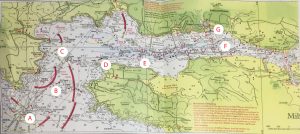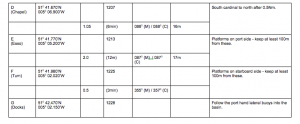Preparation
Before reading this page grab a copy of the training almanac and chart (and a real ones if possible).
Before reading this page mark sure you know the basics and reading a chart.
Why is this important?
This is all about navigating into and out of a port or safe anchorage.
In such situations we don’t have time to run up and down to the chart table, read the chart, read the almanac, calculate tides, identify marks… etc as we go along. We need to plan all of the above and more in advance.
Methods
There are many different pilotage methods and with practice you can learn which is the most appropriate method in the situation you find yourself in.
These methods include:
– Following distinctive charted objects by eye
– Using a GPS or chart plotter
– Using transits
– Bearings and distance
– Contours
Additional Information
There are also additional information you need to have close a hand when you are coming into port:
– Tide Heights
– Port contact details
Writing the information down
So that we have all of this information close at hand it is good practise to write are pilotage plan down on one sheet of paper that can be safety taken on deck.
Try to include all the information you need into one clear set of instructions.
For a fuller explanation of pilotage plans see the links below.
Example
Imagine you had to enter Milford Haven. You might set up a route as illustrated on this chartlet.

Not for use in navigation
Here is an example of what the pilotage document could look like.

 Not for use in navigation
Not for use in navigation
View a full copy here: Milford Haven Pilotage Plan (not to be used for navigation)
Download an editable version: Blank Pilotage Plan
Now watch these videos from Motor Boat & Yachting
Video: skill
Links
RYA: Pilotage
The things you need to think about when entering or exiting a port or anchorage.
Sailtrain: Pilotage
The Sail Train guide to pilotage.
Progression
Practice these methods in the real world, first in places with which you are familiar.
Feedback
The content of these pages is put together in good faith and is constantly evolving. It is possible that errors exist within this content. If you spot an error or would like to add anything to these pages please contact use via email.
Reading the content of these pages is not a substitute for completing a RYA Shorebased course or similar.
